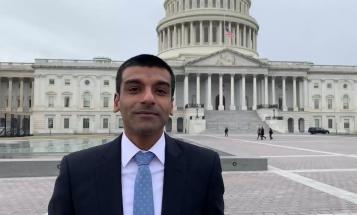
Supreme Court Gets it Wrong…and Right on Democracy
Bad news: the Court continued down its recent path of manipulating the rules for corporations and the one percent.
Good news: the Court cleared the way to solving a defect in our democracy known as "prison-based gerrymandering."
 Despite no health care ruling—tune in on Thursday for that—it was a big day at the U.S. Supreme Court.
Despite no health care ruling—tune in on Thursday for that—it was a big day at the U.S. Supreme Court.
In addition to the Arizona immigration case, there were two very significant rulings for our democracy.
First, the Court continued down its recent path of manipulating the rules for corporations and the one percent to create a society in which the strength of a citizen's voice depends upon the size of her wallet.
In another 5-4 vote, the U.S. Supreme Court summarily reversed a Montana Supreme Court decision upholding the state's 100-plus-year-old law prohibiting corporations from spending directly on political campaigns. The ruling means that Montana's Corrupt Practices Act—passed by citizen initiative in order to take control of the state back from dominant mining interests—is struck down, and corporations are free to spend directly in Montana politics.
This case gave the U.S. Supreme Court a chance to revisit its disastrous Citizens United decision in light of new facts presented in Montana. But, the Court missed this chance, sticking instead with its "one size fits all, facts don't matter" approach.
We knew that summary reversal was a significant risk, so we teamed up with former acting Solicitor General Walter Dellinger and others to file an amicus brief urging the Court to grant Montana the respect it deserves by looking at the evidence and hearing arguments before ruling on the case.
Mr. Dellinger, currently a partner at O'Melveny & Myers LLP, noted that "it is very disappointing that the Supreme Court would not even give Montana its day in court to show through full briefing and argument why its hundred year old Corrupt Practices Act is necessary to protect Montana's government from corruption."
Now we must move forward to educate the next generation of justices, and amend the Constitution if necessary, to make perfectly clear that the First Amendment was never intended as a tool for use by corporations and the wealthiest one percent to dominate our political process.
Now for the good news: the Court cleared the way to solving a defect in our democracy known as "prison-based gerrymandering."
The U.S. Census Bureau counts incarcerated persons at their prison location, rather than their actual home communities. This makes no sense since inmates are not part of the community where their prisons happen to be housed, and a prison cannot be one's legal residence in most states. The vast majority of states do not allow incarcerated persons to vote. And, even in those that do, inmates are usually required to vote at their legal residence, which is almost always their last pre-incarceration address.
Since legislative districts from Congress down to city council are drawn based upon Census data, the Bureau's flawed counting method significantly distorts fair representation. People who live in districts that contain a prison end up with more voting power than their neighbors in adjacent districts. For example, if we live in adjacent city council districts and if 50% of the population in my district is in a prison, I can have twice as much voting power as you do since we both elect one city councilor but you may have twice as many voters in your jurisdiction—a one-person, one-vote problem. On a statewide level, the practice particularly harms urban communities and communities of color that disproportionately contain the home residences of incarcerated persons. But, as the city council example shows, prison-based gerrymandering actually denies fair representation to anyone who doesn’t happen to live in a district containing a large prison.
Four states have passed laws that address this problem in one way or another—New York, Delaware, California, and Maryland. Maryland's groundbreaking "No Representation Without Population Act" counts incarcerated persons as residents of their legal home addresses for purposes of congressional redistricting, as well as for state and local redistricting. The law was upheld unanimously by a three-judge District Court and then appealed directly to the U.S. Supreme Court.
Today, the Court summarily affirmed the Maryland District Court, upholding Maryland's forward-looking law.
This means that states across the country are free to move forward to solve prison-based gerrymandering. And, it's one more reason that the U.S. Census Bureau should change its method of counting prison populations, saving 46 remaining states the trouble of solving a national problem in a piecemeal fashion.



